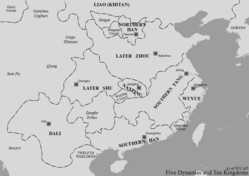Northern Han dynasty
| Han | ||||||||||
| 漢 | ||||||||||
|
||||||||||
|
Northern Han shown in greenish blue
|
||||||||||
| Capital | Taiyuan | |||||||||
| Languages | Chinese | |||||||||
| Religion | Buddhism, Taoism, Confucianism, Chinese folk religion | |||||||||
| Government | Monarchy | |||||||||
| Emperor | ||||||||||
| • | 951–954 | Emperor Shizu | ||||||||
| • | 954–968 | Emperor Ruizong | ||||||||
| • | 968 | Emperor Shaozhu | ||||||||
| • | 968–979 | Emperor Yingwudi | ||||||||
| Historical era | Five Dynasties and Ten Kingdoms Period | |||||||||
| • | Established | 951 951 | ||||||||
| • | Ended by the Song Dynasty | 979 979 | ||||||||
| Currency | Chinese cash, Chinese coin, copper coins etc. | |||||||||
|
||||||||||
| Today part of |
|
|||||||||
The Northern Han kingdom (simplified Chinese: 北汉; traditional Chinese: 北漢; pinyin: Běi Hàn) was a state of the Five Dynasties and Ten Kingdoms period. It was founded by Liu Min (劉旻), formerly known as Liu Chong (劉崇), and lasted from 951 to 979.
The short-lived state of Later Han fell in 950. Liu Min founded the Northern Han Kingdom, sometimes referred to as the Eastern Han, in 951 claiming that he was the legitimate heir to the imperial throne of Later Han. Liu Min immediately restored the traditional relationship with the Khitans, who had founded the Liao Dynasty.
Sources conflict as to the origin of the Later Han and Northern Han emperors; some indicate sinicized Shatuo ancestry while another claims that the emperors claimed patrilineal Han Chinese ancestry.
The Northern Han was a small kingdom located in Shanxi with its capital located at Taiyuan. Shanxi had been a traditional base of power since the fading days of the Tang Dynasty in the late ninth century and early tenth century. It was wedged between the two major powers of the day, the Liao Dynasty to the north and the Song Dynasty to the south. It also shared a border with the Tangut kingdom of Western Xia.
The existence of the Northern Han was one of the two major thorns in relations between the Liao Dynasty and the Song Dynasty, the other being the continued possession of the Sixteen Prefectures by the Liao Dynasty. The Northern Han had placed itself under the protection of the Liao.
...
Wikipedia

